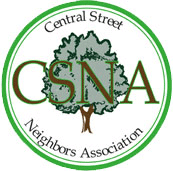CSNA Zoning Forum Draws Crowd, Heated Interest
The Central Street Neighbors Association May 17, 2023 annual meeting and public conversation on zoning drew an estimated 100 residents to the Civic Center's Parasol Room on a weekday evening, with another dozen attending on Zoom, one of the larger public meetings held in Evanston since the pandemic's 2019 start. The event demonstrated the credibility CSNA holds as a source of information on civic affairs, as well as the high public interest in planning and zoning. By comparison, a Zoom-only forum featuring a City of Evanston official and several other co-hosting groups attracted a reported 30 persons the week before.
The focus of the evening discussion was on the contextual basics of Evanston zoning. CSNA President Jeff Smith was interviewed by veteran national political communications expert and human rights activist Kathryne "Kitty" Kurth of Kurth Lampe Worldwide.
Smith recounted the somewhat surprising history of zoning in Evanston, reportedly the first Illinois municipality to adopt a zoning ordinance, in 1921. Zoning was considered a progressive reform at the time, an infringement on private property for the public good. Its primary tools were to separate residential uses from commercial, and to limit building mass and bulk. Apartment buildings were initially classified as commercial businesses in Evanston. Smith said that zoning, which experienced a surge in popularity after the Spanish flu pandemic, was expressly intended in both state and local code as a way to promote health, ensure adequate light and air for residents, and limit crowding and density — he called it "the first social distancing” law. Evanston civic leaders a century ago urged zoning as a way to prevent Evanston from becoming densified like Chicago, which they viewed as Evanston’s antithesis. Drawing on historical sources and century-old news articles and editorials, Smith underscored that Evanston also expressly encouraged home ownership, which, leaders and editorials at the time felt, fostered individual freedom and functioning democracy.
Q&A and public discussion at the meeting quickly focused on, principally, the current proposed re-zoning of the area including and around Ryan Field at Dyche Stadium to include a busier and more commercialized use. Judging from audience questions, comments, and applause, most attendees were highly opposed to the proposed changes. Many wanted to know what they could do. Smith, an attorney, urged those concerned to both pursue political solutions and to also prepare for the legal steps that the process should take. Emphasizing that zoning implicates constitutional property rights and that changes to it should safeguard due process of residents, but that the review of zoning becomes quickly legalistic, he urged an evidentiary approach, gathering facts and data as well as opinion.
A third-party group, Most Livable City Association, had several leaders in attendance and distributed flyers comparing the proposed U2 District uses. The group has hired legal counsel and is soliciting funds for challenging the zoning changes at the city level and beyond, if necessary.
The forum was not directed expressly at the proposed stadium district transformation. Another question that came up was housing affordability. Both Smith and Kurth, supporters of affordable housing, challenged the simplistic conflation of greater density with affordability, citing numerous examples, from Chicago to college towns elsewhere, where the opposite has occurred. Smith observed that market forces would not by themselves bring about housing affordability and that there needed to be actions outside of or "disruptive" to a market for that to occur.
- Log in to post comments
